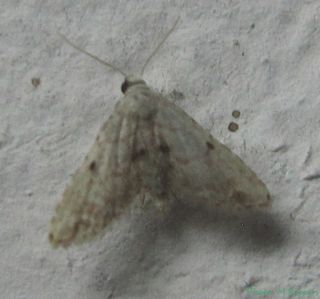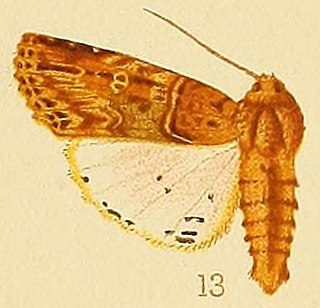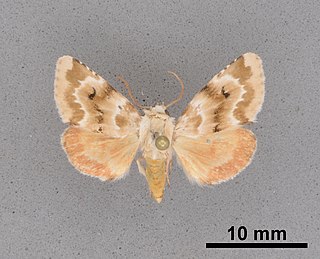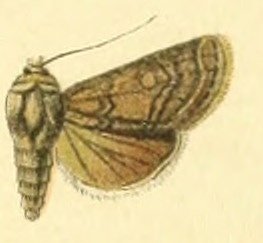
Francis Walker was an English entomologist. He was born in Southgate, London, on 31 July 1809 and died at Wanstead, England on 5 October 1874. He was one of the most prolific authors in entomology, and stirred controversy during his later life as his publications resulted in a huge number of junior synonyms. However, his assiduous work on the collections of the British Museum had great significance.

Araeopteron is a genus of moths of the family Erebidae. The genus was erected by George Hampson in 1893.

Acanthodica chiripa is a moth of the family Noctuidae. It is found in Ecuador.

Acrapex metaphaea is a species of moth of the family Noctuidae first described by George Hampson in 1910. It is found in Africa, including Zimbabwe and South Africa.

Acrapex spoliata is a species of moth of the family Noctuidae first described by Francis Walker in 1863. It is found in Africa, including Sierra Leone and South Africa.

Acylita distincta is a species of moth of the family Noctuidae first described by E. Dukinfield Jones in 1908. It is found in Brazil. Its wingspan is about 26 mm.

Acylita sanguifusa is a species of moth of the family Noctuidae first described by E. Dukinfield Jones in 1908. It is found in Brazil. Its wingspan is about 26 mm.

Acylita monosticta is a species of moth of the family Noctuidae first described by E. Dukinfield Jones in 1908. It is found in Brazil. Its wingspan is about 24 mm.
Acylita dukinfieldi is a species of moth of the family Noctuidae first described by William Schaus in 1894. It is found in Brazil. Its wingspan is about 30 mm.

Spodoptera peruviana is a moth of the family Noctuidae. It is found South America, including Peru.
Micragrotis lacteata is a species of moth of the family Noctuidae. It is found in Africa, including Kenya.

Schinia arefacta, commonly known as the arefacta flower moth, is a moth of the family Noctuidae. It is endemic to Florida and Georgia.
Lasionycta decreta is a moth of the family Noctuidae. It is found in China.

Euxoa cognita is a moth of the family Noctuidae. It is found in central Asia, including western Turkestan.

The Erebinae are a subfamily of moths in the family Erebidae erected by William Elford Leach in 1815. Erebine moths are found on all continents except Antarctica, but reach their greatest diversity in the tropics. While the exact number of species belonging to the Erebinae is not known, the subfamily is estimated to include around 10,000 species. Some well-known Erebinae include underwing moths (Catocala) and witch moths (Thermesiini). Many of the species in the subfamily have medium to large wingspans, up to nearly 30 cm in the white witch moth, which has the widest wingspan of all Lepidoptera. Erebine caterpillars feed on a broad range of plants; many species feed on grasses and legumes, and a few are pests of castor bean, sugarcane, rice, as well as pistachios and blackberries.
Koyaga falsa is a species of moth of the family Noctuidae first described by Arthur Gardiner Butler in 1885. It is found in China, Korea and Japan.
Koyaga numisma is a species of moth of the family Noctuidae first described by Otto Staudinger in 1888. It is found in Russia, China, Korea and Japan.
Koyaga senex is a species of moth of the family Noctuidae first described by Arthur Gardiner Butler in 1881. It is found in Japan.
Amerila leucoptera is a species of moth of the subfamily Arctiinae. It was described by George Hampson in 1901. It is found in Benin, Cameroon, the Democratic Republic of the Congo, Ghana, Ivory Coast, Nigeria, Senegal, Sierra Leone, Tanzania, Uganda and Zambia.

Mythimna prominens is a moth of the family Noctuidae. It was described by Francis Walker in 1856. It is found on Malta and in Greece, France, the Iberian Peninsula and Italy. Outside of Europe, it is found in Morocco, the Republic of the Congo, the Democratic Republic of the Congo, Kenya, Réunion, Madagascar, Nigeria, South Africa and Zimbabwe.








